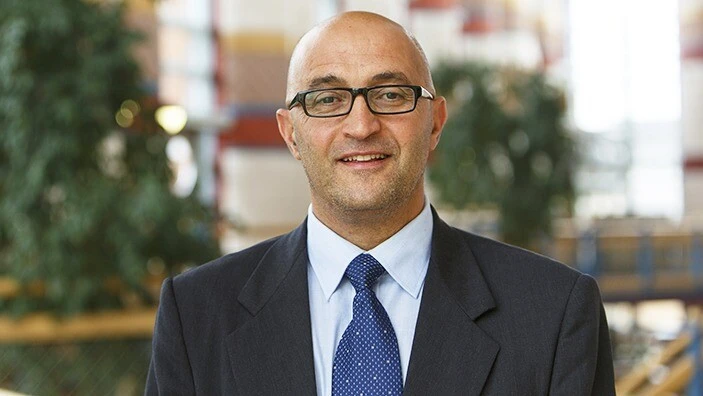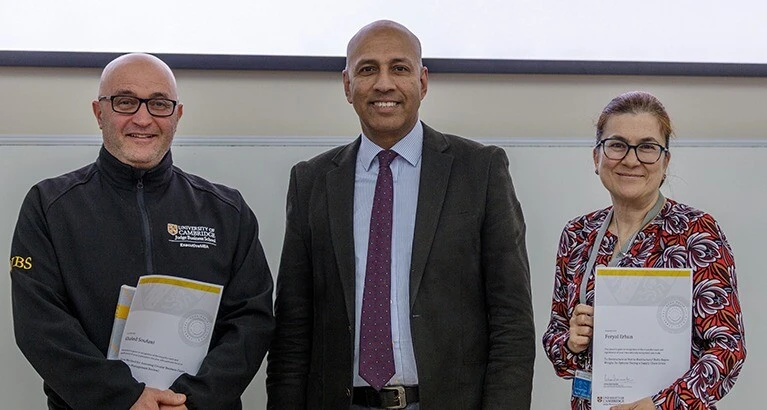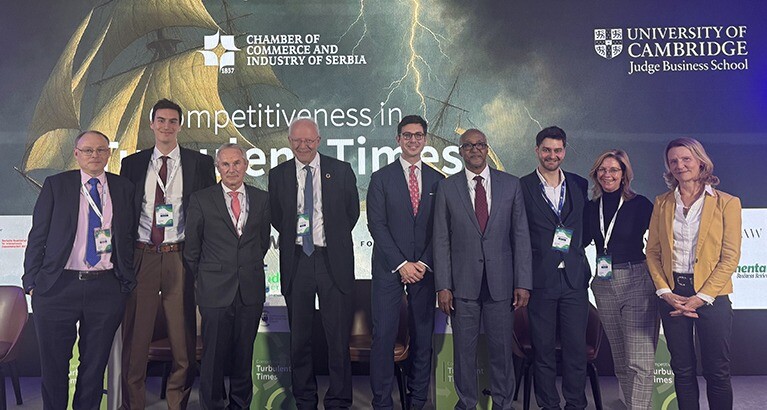Management Practice Professor of Financial Economics and Policy
Director of the Cambridge Executive MBA Programme
Director of the Circular Economy Centre (CEC)
Professorial Fellow of Clare Hall
PhD (University of Nottingham)
My research interests include circular economy, sustainable economic growth, innovation, corporate finance, financial and managerial strategy, entrepreneurial finance, the economics and finance of small-medium sized enterprises, and financial economics. I was previously an investment banker, and my academic work has been included in policy reports by the EU and the Institute of Directors.
I’m a member of the Economics and Policy subject group at Cambridge Judge Business School, which analyses how economics can improve growth and business performance.

Professional experience
Management Practice Professor of Financial Economics and Policy, and a member of the Economics and Policy group at the University of Cambridge Judge Business School, Professor Soufani holds a masters degree in Applied Economics and a PhD in Financial Economics.
Professor Soufani has published extensively in economics and finance in areas relating to financial management, corporate restructuring, M&A, private equity, venture capital and family business and the financial and economic affairs of small to medium-sized enterprises. His research also includes work on economic growth and innovation relating to the circular economy and fast-growing markets and economies. His work is widely cited and included in policy reports by organisations such as the EU, OECD and the Institute of Directors. His work has also been cited and published by the World Economic Forum. He sits on the editorial boards of a number of international academic journals. Before joining academia, Professor Soufani worked in investment banking in the area of bond and money market trading. Professor Soufani has been the academic programme director for many Executive Education programmes for major companies and financial institutions as well as government organisations.
Previous appointments
Professor Soufani was an Associate Professor of Finance at Concordia University in Canada until April 2013.
Publications
Selected publications
- Welch, S. and Soufani, K. (2024) “Find a circular strategy to fit your business model.” MIT Sloan Management Review, 3 June 2024
- Soufani, K. and Loch, C. (2021) “Circular supply chains are more sustainable. Why are they so rare?” Harvard Business Review, 15 June 2021
- Aboulamer, A., Soufani, K. and Esposito, M. (2020) “Financing the circular economic model.” Thunderbird International Business Review, 62(6): 641-646 (DOI: 10.1002/tie.22123)
- Geissdoerfer, M., Pieroni, M.P.P., Pigosso, D.C.A. and Soufani, K. (2020) “Circular business models: a review.” Journal of Cleaner Production, 277: 123741 (DOI: 10.1016/j.jclepro.2020.123741)
- Esposito, M., Tse, T. and Soufani, K. (2018) “Introducing a circular economy: new thinking with new managerial and policy implications.” California Management Review, 60(3): 5-19 (DOI: 10.1177/0008125618764691)
- Esposito, M., Tse, T., Soufani, K. and Xiong, L. (2017) “Feeding the future of agriculture with vertical farming.” Stanford Social Innovation Review, 27 December 2017
Journal articles
- Welch, S. and Soufani, K. (2025) “A new method for assessing circular business cases.” MIT Sloan Management Review, 67(1) (DOI: 10.63383/hMco9133)
- Welch, S., Soufani, K. and Morales, E. (2025) “How circularity can be a strategic response to tariffs.” Harvard Business Review, 18 June 2025
- Welch, S., Soufani, K. and Morales, E. (2025) “AI’s growing waste problem – and how to solve it.” Harvard Business Review, 28 February 2025
- Welch, S. and Soufani, K. (2024) “Find a circular strategy to fit your business model.” MIT Sloan Management Review, 65(4)
- Esposito, M., Tse, T., Soufani, K. and Chong, L. (2022) “How can vertical farming ensure the future of food security? [in Arabic]” Stanford Social Innovation Review (Arabic), 26 January 2022
- Soufani, K. and Loch, C. (2021) “Circular supply chains are more sustainable. Why are they so rare?” Harvard Business Review, 15 June 2021
- Aboulamer, A., Soufani, K. and Esposito, M. (2020) “Financing the circular economic model.” Thunderbird International Business Review, 62(6): 641-646 (DOI: 10.1002/tie.22123)
- Geissdoerfer, M., Pieroni, M.P.P., Pigosso, D.C.A. and Soufani, K. (2020) “Circular business models: a review.” Journal of Cleaner Production, 277: 123741 (DOI: 10.1016/j.jclepro.2020.123741)
- Aboulamer, A., Esposito, M. and Soufani, K. (2019) “Financing the circular economy model [in Arabic].” Harvard Business Review (Arabic), 27 June 2019
- Esposito, M., Tse, T. and Soufani, K. (2018) “Introducing a circular economy: new thinking with new managerial and policy implications.” California Management Review, 60(3): 5-19 (DOI: 10.1177/0008125618764691)
- Esposito, M., Tse, T. and Soufani, K. (2018) “Reverse logistics for postal services within a circular economy.” Thunderbird International Business Review, 60(5): 741-745 (DOI: 10.1002/tie.21904)
- Esposito, M., Tse, T. and Soufani, K. (2018) “The circular economy: an opportunity for renewal, growth, and stability.” Thunderbird International Business Review, 60(5): 725-728 (DOI: 10.1002/tie.21912)
- Soufani, K., Tse, T., Esposito, M., Dimitriou, G. and Kikiras, P. (2018) “Bridging the circular economy and social enterprise: the Dutch Ministry of Defence and Biga Groep.” European Business Review, 18 March 2018
- Soufani, K., Tse, T., Esposito, M., Dimitriou, G. and Kikiras, P. (2018) “A roadmap to circular economy in EU defence inspired by the case of the Dutch Ministry of Defence.” The European Financial Review, 10 February 2018
- Esposito, M., Soufani, K. and Tse, T. (2017) “Comment l’industrie automobile peut s’inspirer de l’économie circulaire.”Harvard Business Review (France), 16 February 2017
- Esposito, M., Soufani, K. and Tse, T. (2017) “Les postiers, sauveurs de l’économie circulaire?”Harvard Business Review (France), 20 April 2017
- Esposito, M., Tse, T., Soufani, K. and Xiong, L. (2017) “Et si l’agriculture pouvait de nouveau être un secteur d’avenir?”Harvard Business Review (France), 29 November 2017
- Esposito, M., Tse, T. and Soufani, K. (2017) “Come la logistica inversa potrebbe resuscitare il servizio postale in declino.”Harvard Business Review (Italy), 3 May 2017
- Esposito, M., Tse, T., Soufani, K. and Xiong, L. (2017) “Feeding the future of agriculture with vertical farming.”Stanford Social Innovation Review, 27 December 2017
- Esposito, M., Tse, T. and Soufani, K. (2017) “Is the circular economy a new fast-expanding market?”Thunderbird International Business Review, 59(1): 9-14 (DOI: 10.1002/tie.21764)
- Esposito, M., Tse, T. and Soufani, K. (2016) “Food waste and the circular economy: no stinky business.”California Management Review Blog, 30 March 2016
- Esposito, M., Tse, T. and Soufani, K. (2016) “How businesses can support a circular economy.”Harvard Business Review, 1 February 2016
- Esposito, M., Tse, T. and Soufani, K. (2016) “Companies are working with consumers to reduce waste.”Harvard Business Review, 7 June 2016
- Esposito, M., Soufani, K. and Tse, T. (2016) “Entreprise, consommateur: pourquoi l’économie circulaire est la voie à suivre.”Harvard Business Review (France), 11 February 2016
- Esposito, M., Soufani, K. and Tse, T. (2016) “Pourquoi vous devez miser sur le gaspillage alimentaire.”Harvard Business Review (France), 22 April 2016
- Esposito, M., Tse, T. and Soufani, K. (2016) “The circular economy takes on food waste.”Stanford Social Innovation Review, 1 April 2016
- Tse, T., Esposito, M. and Soufani, K. (2016) “Fast-expanding markets: the revolution of the microeconomy.”Thunderbird International Business Review, 58(1): 5-11 (DOI: 10.1002/tie.21738)
- Esposito, M., Tse, T. and Soufani, K. (2016) “The seminal concept of fast expanding markets.”Thunderbird International Business Review, 59(1): 5-7 (DOI: 10.1002/tie.21834)
- Esposito, M., Soufani, K. and Tse, T. (2017) “La chimie verte: moins d’impact écologique, plus d’avantage compétitif.”Harvard Business Review (France), 17 January 2017
- Esposito, M., Tse, T. and Soufani, K. (2015) “Ballando con la crescita.”Harvard Business Review (Italy), 18 December 2015
- Esposito, M., Tse, T. and Soufani, K. (2015) “L’avanzata dell’economia circolare.”Harvard Business Review (Italy), 2 October 2015: 94-97
- Tse, T., Esposito, M. and Soufani, K. (2015) “How companies can benefit from the circular economy.”California Management Review Blog, 4 November 2015
- Tse, T., Esposito, M. and Soufani, K. (2015) “Why the circular economy matters.”The European Business Review, 20 November 2015
- Dbouk, W., Jamali, I. and Soufani, K. (2014) “The effectiveness of technical trading for Arab stocks.”Emerging Markets Finance and Trade, 50(4): 5-25 (DOI: 10.2753/REE1540-496X500401)
- Tse, T., Esposito, M., Soufani, K., Santora, J.C. and Roux, L. (2014) “Are we falling asleep at the switch, again? Some propositions for executive compensation.”International Journal of Trade and Global Markets, 7(1): 53-66 (DOI: 10.1504/IJTGM.2014.058717)
- Cole, O., Soufani, K. and Tse, T. (2013) “Notes on Islamic economics and finance.”International Journal of Trade and Global Markets, 6(1): 83-91 (DOI: 10.1504/IJTGM.2013.051551)
- Tse, T., Esposito, M. and Soufani, K. (2013) “Fast expanding markets: where new growth can be found.”The European Business Review, 10 March 2013
- Soufani, K., Poutziouris, P. and Michaelas, N. (2013) “Trade credits: the case of small-medium sized enterprises.” Global Business and Economic Review, 15(2-3): 163-180 (DOI: 10.1504/GBER.2013.053067)
- Ibrahim, A.B., Lam, J., Soufani, K. and Poutziouris, P. (2010) “A longitudinal case research of a large family firm: Saputo Inc.” International Journal of Management Cases, 13(1): 67-88
- Tse, T. and Soufani, K. (2010) “Achieving strategic innovation through dilemma reconciliation.” International Journal of Management Practice, 4(2): 117-133 (DOI: 10.1504/IJMP.2010.033690)
- Ibrahim, B., McGuire, J. and Soufani, K. (2009) “An empirical investigation of factors contributing to longevity of small family firms.” Global Economy and Finance Journal, 2(2): 1-21
- Tse, T. and Soufani, K. (2008) “The effects of economic conditions on takeover bid premiums.” International Economics and Finance Journal, 3(1): 91-106
- Soufani, K., Tse, T. and Chen, Q. (2008) “Performance of venture backed and non-venture backed IPO: evidence from Canada and the UK.” Journal of International Finance and Economics, 8(2): 1-22
- Soufani, K., Vrontis, D. and Poutziouris, P. (2006) “Private equity for small firms: a conceptual model of adaptation versus standandardisation strategy.” International Journal of Entrepreneurship and Small Business, 3(3-4): 498-515 (DOI: 10.1504/IJESB.2006.009289)
- Ibrahim, A.B., Lam, J., Soufani, K. and Poutziouris, P. (2004) “Entrepreneurial development at Artelite.” International Journal of Management Cases, 6(3-4): 44-58
- Ibrahim, A.B., McGuire, J., Soufani, K. and Poutziouris, P. (2004) “Patterns of strategy formation in a family firm.”International Journal of Entrepreneurial Behaviour and Research, 10(1-2): 127-140 (DOI: 10.1108/13552550410521416)
- Ibrahim, A.B., Soufani, K., Poutziouris, P. and Lam, J. (2004) “Qualities of an effective successor: the role of education and training.”Education and Training, 46(8-9): 474-480 (DOI: 10.1108/00400910410569597)
- Pavlov, A., Poutziouris, P. and Soufani, K. (2004) “Evaluating flexibility in small business finance.” Journal of Entrepreneurial Finance, 9(1): 73-97
- Ibrahim, A.B., Soufani, K. and Lam, J. (2003) “Family business training: a Canadian perspective.”Education and Training, 45(8-9): 474-482 (DOI: 10.1108/00400910310508865)
- Poutziouris, P., Chittenden, F., Watts, T. and Soufani, K. (2003) “A comparative analysis of the impact of taxation on the SME economy: the case of UK and US – New York State in the year 2000.”Environment and Planning C: Government and Policy, 21(4): 493-508 (DOI: 10.1068/c0338)
- Soufani, K. (2003) “Small business growth and tax policy in Canada: a theoretical model.”Environment and Planning C: Government and Policy, 21(4): 567-578 (DOI: 10.1068/c0322)
- Tse, T. and Soufani, K. (2003) “Business strategies for small firms in the new economy.”Journal of Small Business and Enterprise Development, 10(3): 306-320 (DOI: 10.1108/14626000310489781)
- Ibrahim, A.B. and Soufani, K. (2002) “Entrepreneurship education and financial training in Canada: a critical assessment.”Education and Training, 44(8-9): 421-430 (DOI: 10.1108/00400910210449268)
- Soufani, K. (2002) “On the determinants of factoring as a financing choice: demand analysis.” Journal of Economics and Business, 54(2): 239-252
- Soufani, K. (2002) “The decision to finance accounts receivables: the factoring option.”Managerial and Decision Economics, 23(1): 21-32 (DOI: 10.1002/mde.1046)
- Ibrahim, A.B., Soufani, K. and Lam, J. (2001) “A study of succession in a family firm.”Family Business Review, 14(3): 245-258 (DOI: 10.1111/j.1741-6248.2001.00245.x)
- Soufani, K. (2001) “The role of factoring in financing UK SMEs: a supply side analysis.”Journal of Small Business and Enterprise Development, 8(1): 37-46 (DOI: 10.1108/EUM0000000006811)
- Tse, T. and Soufani, K. (2001) “Wealth effects of takeovers in merger activity eras: empirical evidence from the UK.”International Journal of the Economics of Business, 8(3): 365-377 (DOI: 10.1080/13571510110079829)
- Soufani, K. (2000) “Factoring and UK small business.”Journal of Small Business and Entrepreneurship, 15(3): 78-89 (DOI: 10.1080/08276331.2000.10593290)
- Soufani, K. and Poutzouris, P. (1999) “Commentaries on ‘The relationship between planning sophistication and performance in small businesses’.”International Small Business Journal, 18(1): 108-110 (DOI: 10.1177/0266242699181006)
Books, monographs, reports and case studies
- Soufani, K. and Welch, S. (2024) Leveraging digital solutions for the circular economy. Geneva: United Nations Economic Commission for Europe (UNECE).
- Astrachan, J.H., Poutziouris, P. and Soufani, K. (eds.) (2004) Family business casebook annual 2004. Kennesaw, GA: Cox Family Enterprise Center, Coles College of Business, Kennesaw State University.
Book chapters
- Soufani, K., Cole, O. and O’Sullivan, P. (2015) “Is Islamic finance a complement to conventional Western finance? Underlying principles and viability.” In: O’Sullivan, P., Allington, N.F.B. and Esposito, M. (eds.) The philosophy, politics and economics of finance in the 21st century: from hubris to disgrace. Abingdon, Oxon and New York, NY: Routledge, pp.74-90
- Aboulamer, A. and Soufani, K. (2012) “Sustainable finance and small medium enterprises.” In Hahn, R., Janzen, H. and Matten, D. (eds.) Die gesellschaftliche Verantwortung des Unternehmens: Hintergründe, Schwerpunkte und Zukunftsperspektiven. Stuttgart: Schäffer-Poeschel, pp.307-319
- Soufani, K. (2012) “Factoring and invoice financing.” In: Cumming, D. (ed.) The Oxford handbook of entrepreneurial finance. Oxford: Oxford University Press, pp.558-577
- Tse, T., Soufani, K. and Roux, L. (2012) “The ethical and social dimensions of executive compensation.” In: O’Sullivan, P. et al (eds.) Business ethics: a critical approach: integrating ethics across the business world. Abingdon: Routledge, pp.101-117
- Soufani, K. (2006) “Comment on ‘Monetary issues’.” In: Hölscher, J. (ed.) Germany’s economic performance: from unification to euroisation. Basingstoke: Palgrave Macmillan, pp.101-106
- Ibrahim, A.B., Soufani, K., Lam, J. and Poutziouris, P. (2004) “The rise and fall of a large family business: the T. Eaton Co Ltd.” In: Astrachan, J.H., Poutziouris, P. and Soufani, K. (eds.) (2004) Family business casebook annual 2004. Kennesaw, GA: Cox Family Enterprise Center, Coles College of Business, Kennesaw State University, pp.203-236
- Soufani, K. and Tse, T. (2004) “Economic efficiency in traditional and dot.com firms: a theoretical approach.” In: Etemad, H. (ed.) International entrepreneurship in small and medium size enterprises: orientation, environment and strategy. Cheltenham: Edward Elgar, pp.178-188
- Poutziouris, P., Soufani, K. and Michaelas, N. (2003) “On the determinants of exporting: UK evidence.” In: Etemad, H. and Wright, R. (eds.) Globalization and entrepreneurship: policy and strategy perspectives. Cheltenham: Edward Elgar, pp.15-37
- Soufani, K. and Poutziouris, P. (2003) “Factoring: is factoring a suitable option for growing small businesses?” In: Jolly, A. (ed.) The growing business handbook: inspiration and advice from successful entrepreneurs and fast growing UK companies. London: Kogan Page, 6th edition, pp.116-121
- Soufani, K. (2002) “Invoice financing as a strategic option for small businesses.” In: Ibrahim, A.B. and Ellis, W.H. (eds.) Entrepreneurship and small business management: text, readings and cases. Dubuque, IA: Kendal Hunt, 4th edition, pp.462-467
Awards and honours
- Cambridge Judge Business School Teaching Award, 2023
- Listed as one of the “Favorite Professors of the Executive MBA Class”, Poets & Quants, 2022
- Vice-Chancellor’s Award for Research Impact and Engagement, Runner-up in the “Established Academic Award” category, 2022
- Dawson Research Impact Award, 2020
- Cambridge Judge Business School Faculty Activity Award, 2019
- Cambridge Judge Business School Research Award, 2018
- Cambridge Judge Business School Teaching Award, 2013
- Thirst for Knowledge Best Teacher of the Year Award, Aalto EE (Helsinki, Finland), 2012
- Distinguished Researcher Award with an honourable mention, John Molson School of Business, Concordia University (Montreal, Canada), 2003
News and insights
Faculty news
Honours for impactful reach and significance
Faculty members Helen Haugh, Feryal Erhun and Khaled Soufani win impact awards from Cambridge Judge Business School.
Cambridge Judge Business School faculty and staff were among participants at the Sustainable Development Forum 2025 held in Belgrade, Serbia, on 30-31 October, which focused on cross-sector collaboration involving government, industry and academia in order to tackle the green transition and achieve sustainable development.
Research centre news
UN report: circular economy boosted by digital tech
United Nations posts report authored at the Circular Economy Centre on how digitisation can advance circular economy principles and help meet UN goals on responsible consumption and production.
Media coverage
Executive Courses | 22 November 2021
Sustainability leadership courses go beyond the bottom line
Executive programs that focus on sustainability and responsible business are getting more and more popular writes Seb Murray in Executive Courses.
Poets & Quants | 12 August 2021
2021 Best & Brightest EMBAs: Christie Marr, Cambridge Judge
Christie Marr, currently studying Executive MBA at Cambridge Judge Business School, is among Poets & Qaunts’ 2021 Best and Brightest EMBAs. Christie talks about her family, career and gives advice to prospect EMBA students.
Poets & Quants | 12 July 2021
2021 Best and Brightest EMBAs: John Lee
John Lee, currently studying Executive MBA at Cambridge Judge Business School, is featured in Poets & Quants’ Best and Brightest EMBAs list. John talks about his current role, favourite Business School professor and the biggest lesson he gained during the studies: “‘Connection’ and ‘empathy’ is everything. As individuals and as a cohort, we faced so many challenges and adversities during the pandemic. Many of us were affected in different ways, personally and professionally. But what makes a great leader is the ability to find meaning in what we do and how we do it. And this can be achieved through the connections with those around us.”
Harvard Business Review, 15 June 2021
Circular supply chains are more sustainable. Why are they so rare?
CamFM, 12 June 2020
Cambridge Zero Climate Talks
Cambridge Independent, 28 February 2020
From Hollywood ‘logic’ to ‘highly institutionalised myths’ of the workplace
Financial Times, 24 February 2020
Excessive academic focus limits business schools’ contribution to society
Green Biz, 14 February 2020
Rethinking the ‘P’ word
Cordis, 10 January 2020
Where the circular economy and the Internet of Things meet
East Anglia in Business, 26 July 2019
Building a circular economy




